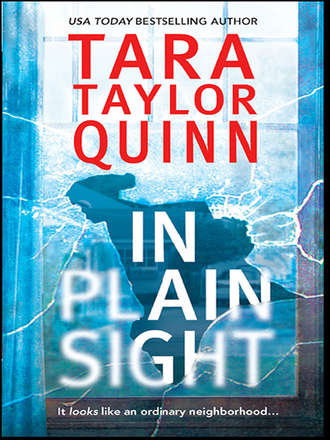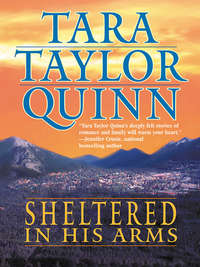
Полная версия
In Plain Sight
Hailey had been pretty resigned about leaving her mother. And hadn’t asked about the woman since. On the other side, Karen Miller hadn’t responded to a single one of the state’s attempts at reconciliation or visitation, and had, in fact, allowed severance proceedings to go forward without any objection whatsoever.
Jan got up from the table and switched sides, sliding in beside the little girl.
“You did some things you shouldn’t have done, Hailey, but more important than what you do is why you do it. You don’t do things to be mean or selfish. You don’t lash out in anger or turn away when you think someone needs your help. That’s what a troublemaker does. You’re kind of like Mrs. Butterworth. You want to take care of things, even when you really can’t. She should have moved to a nursing home where the government could have taken care of her, but she didn’t want to leave you. And you took things that weren’t yours because you weren’t old enough to go to work to earn the money she needed. That means you have a good heart. Not a bad one.”
“You really think so?” The little girl’s eyes were so big and blue they seemed almost jewel-like.
“I know so.”
Hailey ate a couple of hearty bites. And then, shoulders drooping, she laid her fork in the middle of her plate, the handle sinking into the syrup.
“I’m on probation,” she said. “Derek says only bad kids are on probation and they don’t ever get out of foster care.”
Maybe the sentence had been a little harsh, but even in the beginning Jan had seen the potential in Hailey and also the determination, and she couldn’t think of another way to get the point across that continued stealing was unacceptable. Telling her it was wrong hadn’t worked, because in her mind her reasons had always been right and stronger. Telling her no hadn’t stopped her. Threats hadn’t stopped her. Eventually the habit would have ruined her life.
“Derek’s pretty smart, but he’s just a kid, too, and he doesn’t know everything yet,” Jan said, careful not to malign the boy. For now, Hailey was part of the Lincoln family, and her need for stability, a sense of belonging, were the most important factors in the child’s life. The October 23rd court adoption date felt far too distant.
Jan sat back, thoughts of her own inadequacies stealing some of her confidence. She suffered so severely from nightmares—and from a consequent lack of self-trust—that she’d slowly shut herself off from all relationships that weren’t work related. And now she was bringing a child into her life—a full-time resident, who would want friends to spend the night.
She could do it. She knew she could. But it wasn’t going to be easy.
Would Hailey suffer while Jan worked things out?
And even after the court made Hailey her legal daughter, how could she provide this precious and needy child with stability, while she was planning to expose herself to the possible retaliation of the Ivory Nation?
Yet how could she not follow through on a five-year commitment to save the people Jacob Hall would continue to hurt, possibly kill, if he were let go? How could she turn her back on this chance to send a clear and direct message to Bobby Donahue and the rest of the Ivory Nation?
Grunting as much for show as from any real need, Simon hopped from tire to tire, up the ragged edge of the mountain. A foot into each and every one, before shimmying up the tree at the end of the rubber trail. He’d been hard at it all morning—a bit of an alternative to his usual Saturday-morning regime of lying around bored out of his skull and not caring enough to do anything about it.
“Not bad for a first run.” Leonard Diamond, the most perfect specimen of manhood Simon had ever seen, nodded from the base of the tree. “Amanda was right to send you to me. You continue to work like that and I’ll have you ready to tackle any strength or skill exam they can give you—on skis or off—by the end of November, but it’ll cost you. I only work with the best and I don’t come cheap.”
Agent Scott Olsen, and his convoluted FBI expense accounting, was paying for this—so what the hell. The sweat felt damn good.
Simon nodded. And tried not to think about the young woman who—after he’d paid three more visits to the Museum Club—had put him in touch with this acquaintance of her boyfriend’s—who’d been an ex but no longer was, he’d discovered. If Leonard Diamond, the independent trainer, turned out to be providing his services to terrorists, as the FBI suspected, Amanda Blake was running with a very dangerous crowd.
With instincts that weren’t quite as dead as he’d told himself they were, Simon had garnered more about twenty-five-year-old Amanda than he’d wanted to. The girl was back with her too-mysterious boyfriend, but she wasn’t all that happy about the relationship. In fact, the beautiful young lady seemed more resigned than in love. And more than a little afraid, as well. Olsen, who’d received his tips from her through intricate channels, had had the same impression. Simon had practically had to give her his birth certificate before she’d agreed to get him this trial with Diamond. She said that his time was premium and he was hit on by every quack parent in the world who wanted his kid to be a star. Thankfully, compliments of Scott Olsen’s connections, Simon now had a fake identity. A guy with the same name, who had been born and raised in Alaska and was a first-time visitor to Flagstaff. His alter ego even had a new apartment. If he needed a place to receive visitors.
The fact that this new game might be dangerous didn’t faze him a bit.
Simon wasn’t afraid to die.
An hour and a half later, after showering, securing a locker and filling out a minimal amount of paperwork, Simon turned onto his street just in time to see Jan pull into her driveway next door. When she didn’t enter the garage, he wondered if she was still a bit gunshy from the brick incident earlier in the week. Then he slowed to a stop, gawking when he saw the elflike child who climbed out of the passenger seat.
Who the hell was she? In the four years he’d been living next door to Ms. Janet McNeil and in the three or so years he’d been meeting her at her mailbox, he’d never once seen or heard mention of a child in her life.
A widowed mother in Sedona, check. An unmarried salesman brother, right. No ex-husbands. No cousins or aunts or uncles or grandparents. No friends he knew of, with or without children.
The woman worked. Took care of her mother. Her home. Was friendly to her neighbors. And talked to him a few minutes every day.
She waved and Simon could feel the heat under his skin, a rare occurrence for someone who didn’t care enough about anything to get embarrassed. He waved back and continued on to his driveway, but stopped just over the curb and got out.
Jan was down at the mailbox, letters in hand, just standing. Almost as if she was waiting for him.
Not good. Not good at all.
He walked over, even though he knew it was a big mistake to do so. The woman, her welfare, her guests, didn’t matter to him, other than for the distant role she played in the passing of his days.
“Hey, neighbor,” he greeted her, including the girl in his grin. About seven, he’d guess, based on her size. And it’d been a hard seven years. The awareness in those eyes, the chin that held back expression rather than softening in response to a friendly smile—they told a familiar story.
“Simon, I wanted Hailey to meet you.” Jan’s voice was higher than it usually was. She was too perceptive to be humoring this child with false cheer. Which told him she was tense about something.
“Hi, Hailey.” He held out his hand. Her grip was tiny, but firm.
“Hi.”
“How old are you?” Wasn’t that what you said to kids you weren’t rescuing from hell—or arresting?
“Eight.”
A year off. Not bad for a guy who’d been off the streets for almost a decade.
“Hailey and I are in the process of becoming a family.” Jan moved a bit closer to the girl.
“She’s trying to adopt me, but I keep telling her they won’t let it happen,” the child said.
“Hailey’s a little short on faith at the moment, and I thought I’d bring her to see her new home so she can start visualizing our future together.”
Simon slid his hands into the pockets of the sweats he’d changed into after his locker-room shower. Jan with a child? The idea threw him. And that didn’t happen often.
Why should it matter to him if she wanted to take on the responsibility, the guaranteed heartache of parenthood?
Why would picturing her as a mother affect him at all?
It didn’t. He was just suffering a bit of an adrenaline letdown after the morning’s workout. Mixed with a little altitude adjustment.
“Are you a cop?”
While he swallowed the need to choke, Jan chuckled. “Simon writes schoolbooks, sweetie.”
Those shrewd, knowing eight-year-old eyes studied him—whether in assessment or disbelief, he didn’t know. Simon smiled, slouching, completely alert.
“Nope, just a writer,” he told her, his voice more relaxed than the rest of him.
“You sure you aren’t a cop?” Hailey frowned. “’Cause my mom taught me to spot ’em.” Her curly hair was almost in her eyes as she peered up at him. “She says you can always tell a cop by the way his eyes see everything going on, when most people just see what they’re staring at. Your eyes look all over. They don’t stare.”
Observation duly noted. How had he survived years undercover, if he was that obvious? he wondered wryly.
“Sounds like your mom was a smart lady,” he said, cognizant of the fact that the little girl had obviously lost the woman prematurely. “And I’m sorry to disappoint you, but rather than running around the streets catching bad guys I just sit home all day and type stuff that college kids read for class.”
“I’m not disappointed,” Hailey said, nodding. “I don’t know if I’d like living next door to a cop. I’d have to worry about him finding out that I’m not good.”
Simon did choke, then. And glanced up in time to catch the pained look on Jan’s face. There was a lot going on here that he didn’t understand. And that was fine by him.
Except for that small, curious part of him that wanted all the answers.
“Hailey Miller, you are good,” Jan said firmly, sounding much more like the woman he’d been meeting at the mailbox. “And I’m glad to hear that you’re planning to live next door to Simon, because I’m pretty determined on this matter and once I set my mind to something I make it happen.”
The white supremacist she was attempting to prosecute crossed his mind. And left him feeling tense.
“Do you have a court date?” he asked, still smiling as he glanced from one to the other.
“October 23rd,” they said together. Hailey studied Jan for a long moment, one that Simon witnessed with an inexplicable pull, and then the little girl slid her hand into Jan’s. “It was nice meeting you, Simon,” she said.
“Nice meeting you, too, Hailey. I look forward to living next door to you.”
“Thank you.”
“See ya,” Jan said, grinning at him as she turned with her charge’s hand still firmly locked in hers.
Simon stood there watching them go.
Hailey looked over her shoulder. “Simon?”
“Yeah?”
“My mom’s stupid.”
He didn’t know what to say to that, so it was fine that they didn’t wait for him to figure it out.
So much for his ability to assess and conquer. Simon watched until they were inside Jan’s house and then walked slowly into his own, to spend the rest of the day doing what he did best. Huddled in front of the computer, bored enough to write ten pages of a book that was supposed to be his nine-to-five job during the week.
5
“Hey, boss, you got a minute?”
Jan looked up from her computer. It was Monday, mid-morning. She’d had another nightmare at three in the morning and hadn’t slept since. “Of course,” she told her assistant. “Come in.”
Andrew, dressed impeccably as always, took one of the two seats in front of her desk.
“I heard you met with Ruple over the weekend.”
She’d figured word would get around. Flagstaff was a small town and Macy’s was a busy place. Or maybe Danny Ruple had said something.
“I did, yes.”
“Is he going to testify?”
The fact that she even had to remind herself that this was Andrew, her handpicked professional soul mate, bothered her. She had to be careful, true, but a complete lack of trust wasn’t healthy.
“I don’t know,” she said, slipping into the navy jacket she’d thrown off earlier. She had some footwork to do over lunch—recreating as much of the Zeidel file as she could, just in case. The only key witness, a roommate, was still in town and had agreed to talk to her. “He didn’t say yes, but he didn’t say no.”
Frowning, Andrew shook his head and said, “I’m just sick about the missing file. You know I’ll do anything I can to help you rebuild the case, if he accepts your offer.”
“Thanks.” Jan’s smile was almost genuine and her shoulders lightened. “I know your own caseload is heavy right now, and I promised you’d have time to be a father when the baby came…”
“I’m always here for you, Jan. You know that.”
A life that had gone a bit out of control started to make sense again. She had to remember what she knew—not lose herself in emotions that weren’t always accurate. Or trustworthy.
“I think you’re about the only one who doesn’t think I’m crazy for going after Hall.”
“I admire the hell out of you for it.” The truth of his words was reflected in his open gaze. “I hope to be just like you when I grow up.”
“Hold it, buddy,” she chuckled. “I’m only five years older than you. You’re making me sound ancient.”
“Sorry.” Andrew was grinning, too. “But I mean it. You’re the only one I know who consistently applies the ethics they taught us in law school to everyday life. You work for justice, not politics.”
“There are a lot of us,” she told him, though she wasn’t as sure of that as she’d been even a couple years before. “But when people like the county attorney and the governor have the last say, and they’re elected officials, politics can’t help but play a part.”
“And we end up with compromised justice.”
Jan glanced at the news clipping she’d just pulled up on her computer—which only hinted at the gory details of Lorna Zeidel’s rape and murder two years before. “It’s when politics define justice that I have a problem.”
Andrew leaned forward, resting an arm on the edge of her desk. “And it honestly doesn’t bother you that if you push this and lose, your professional reputation will suffer?”
She shook her head. There were a lot of things bothering her. Her professional reputation wasn’t one of them. “My mother’s health bothers me. Hailey’s adoption bothers me. The young gang members who have nothing better to do than throw bricks through windows bother me.” My awareness of my neighbor’s presence bothers me. “I’m not sure why, but my career doesn’t. I think I’m on the right track.”
“I don’t know how you do it.” Andrew expelled a long breath. “But I’m here to learn.”
“You’re here to teach, too, my friend,” Jan told him. “You’re an excellent attorney. I’ve bowed to your opinion on more than one occasion.”
“Maybe two.” He smiled and then sat back, his expression sober. “What’s this about your mother’s health? I thought she was doing well, keeping busy.”
“She is.” Jan didn’t want to think about her mother right now. “I’m probably overreacting. Growing up with only one parent tends to make you a bit insecure where their existence is concerned.”
“When was the last time you saw her?”
“Less than twenty-four hours ago. I went down yesterday and took her to the Blue Adobe for dinner. We had cheese enchiladas and prickly pear margaritas and talked about a mah-jongg tournament she’s in.”
“Sounds like she’s doing great.”
Yeah. And Jan had just decided to go with what she knew and not with what she feared. To quit letting random feelings control her so much. Everyone had them—those insecurities that overwhelmed common sense. She just seemed to have to work harder than other people to keep hers at bay.
By Thursday, Jan still had not heard from Danny Ruple. But she was using every spare minute she could find, in between directing the continued research into Jacob Hall’s potential fraud victims and maintaining her other cases, to study police reports on Lorna Zeidel—searching for the elusive clue that might at least get her a grand jury indictment.
She’d had no word from her brother after his impromptu visit, but she’d had a quick visit with Hailey the night before. And not including Saturday, she had talked to Simon three times, twice at the mailbox and once when he was getting his paper in the morning.
By the time she got home that night, she was just plain exhausted with life. She’d seen the It’s a Boy sign in the Thorntons’ front yard on her way to work that morning, and felt such regret at losing touch with her friendly neighbors that she’d gone out on her lunch hour and bought them a gift. But she sure didn’t feel like walking two houses down to drop it off.
She didn’t want to, but as soon as she’d finished the toast and peanut butter she was having for dinner she did it anyway. And was rewarded with a greeting from Simon when she returned.
“I brought the trash out and noticed yours wasn’t at the curb, so I thought I’d get it for you,” he said, meeting her at the end of her drive as dusk was starting to fall. Friday and Monday trash pickup had been part of her routine for years. Today, she would have forgotten.
“My gate’s locked.”
“As I discovered.” He walked along with her up to the house, looking so comfortable in khaki slacks and a flannel shirt with tails hanging out and sleeves rolled up past his wrists, that she wished she’d taken time to change out of the maroon skirt and jacket she’d worn to work.
The clicking of her heels against pavement sounded loud in the early-evening silence.
“You been down the street?”
“Mm-hmm.” She walked up the couple of steps to her front door. Pulled it open. “Molly Thornton had her baby.”
“It’s not locked?”
“I was only gone for a few minutes.”
“Could you see your front door every second of that time?”
“Of course not. The Thorntons are on the same side of the street.”
“How do you know someone didn’t see you leave and then enter your house?”
Ignoring the blade of fear that slid through her, Jan forced a chuckle. “Like I said before, you need to be writing suspense, Green. Because stuff like that only happens between the pages of a book or on the screen. I was two houses down, for goodness’ sake.” They were still on her stoop.
“But it only takes…”
“And during that time you were bringing out your trash.”
She went inside. He stayed out.
“You mad at me now?” she asked lightly.
“No.” But he was frowning.
“You just changed your mind about taking my trash out?” She’d been rolling the big can out by herself for years, didn’t need his help, but she couldn’t pass up the opportunity to mess with him.
It took her mind off her weariness.
“Of course not,” he said. “I’ll meet you at the gate.”
“Simon!” She laughed out loud then. “You can come through the house.”
She didn’t really understand his hesitation. It wasn’t as if he hadn’t been inside before. He’d seen every inch of her 2,000-square-foot home when he’d trailed behind the police officer who’d searched it after the brick incident the week before.
He walked through, went out to wheel the trash to the curb, then relocked the gate from the inside and came back into her kitchen, all without a word. He stood there, staring at her.
“What?” She’d poured herself a very weak vodka and orange juice—mostly orange juice—and leaned against the counter, taking a sip.
“It’s none of my business.”
“Probably not. But I’m sure you’ll tell me, anyway.”
He shook his head. “You know what you’re doing. And you have an inside track on crime in this town.”
“Yeah.”
“But I’d still appreciate it if you’d be a little more careful. A woman living alone…”
“I won’t live my life in fear.”
“I’m not suggesting you should. Keep in mind, though, that I live right next door. And I’d like to be able to relax now and then without constantly having to listen for strangers with evil intent bothering someone who’s nice.”
He thought she was nice. That was all right. Because she thought he was sweet.
“Okay,” she said, her mouth twitching as she held back a smile. “In an effort to contribute to your peace of mind, I will be more diligent about locking my door. Since this is the first time in years I can remember leaving it unlocked, I don’t think it’ll be too much of a challenge.”
And she was no idiot. She was prosecuting a killer who had loyal associates. She wanted to live long enough to get him into prison.
“Thank you.”
“Now how about a truce?” She held up her glass. “I have vodka to offer.”
“I accept.”
She was shocked. He was supposed to have made a joke and been out of there. Didn’t he remember his own MO?
Turning, she took down a glass from the cupboard. A juice glass. She didn’t entertain enough to justify highball crystal.
“You pour,” she said, handing him the bottle and pushing the orange juice his way.
He took a splash of juice to go with his vodka, leaned back against the opposite cupboard…and suddenly she was nervous. The man seemed a lot more vital, standing in her kitchen.
“I didn’t realize you knew the Thorntons all that well.” He adjusted his glasses.
His eyes were brown. She’d never noticed before.
“I don’t really. They drop off fruitcakes at Christmas, but I think everyone gets them.”
He nodded. “Never did figure out the appeal there.”
“Me, neither. But my mother likes them. I give them to her.”
“Good, she can have mine next year, too. I feel like a jerk when I throw them away.”
Jan chuckled with him. Took a sip of mostly orange juice and wished it was mostly vodka.
“A few years ago, my washer valve broke when I was out of town,” she said. “The whole house flooded. The Thorntons had just moved in, and they noticed the water coming out from under my doors and called the city to turn off the water. They also helped me move out all my furniture while the damage was being repaired.”
“Where was I?”
“I have no idea.” She smiled at him again. “That was before I’d actually met you. But I think you were gone. For about a month I didn’t see any papers at the end of your drive when I left for work in the morning.”
Oh. Well. It only took a second for her to realize that she’d just admitted that she paid attention. And remembered something that had happened almost four years ago. That was embarrassing.
“I took a…river rafting trip,” he said, stumbling a bit over the words—as if he was finding this experience awkward, as well. “I was gone for almost a month,” he continued, resting one foot in front of the other. “Must have been then.”
She wanted to look away. And didn’t.
“So how were the Thorntons?”
“Fine. They named him Mark.”
“I hear hesitation in your voice,” he said, his expression curious. “Why? Don’t you like the name?”
Were all writers as observant as he was?
“Of course I like the name.” She shrugged, putting her edgy reaction down to fatigue. “I’m sure it’s nothing. They just seemed to go on and on about how happy they were that the baby’s a boy. I got a pretty strong sense that if they’d had a girl they would actually have been disappointed.”
“Maybe they wanted to please the grandparents or something.”
“Maybe. I can’t imagine the sex of a child mattering to me as long as he or she was healthy, but I realize it makes a difference to some people.”
He switched legs, crossing one over the other. She couldn’t really explain why she wasn’t offering him a seat. Standing just seemed like a better idea.









